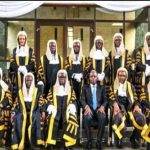 The Presidential Advisory Committee against Corruption says the arrest of the judges by operatives of the state security service is within the ambit of the law, as the judges have no immunity to prosecution.
The Presidential Advisory Committee against Corruption says the arrest of the judges by operatives of the state security service is within the ambit of the law, as the judges have no immunity to prosecution.
The Committee chaired by a Senior Advocate of Nigeria, Professor Itse Sagay, during a presentation of a report on its activities lamented the extent of corruption in the judiciary and stressed the need for an upright
judiciary as the bastion for democracy.
The body has also developed several documents for the government on Corruption Case Management, National Anti-Corruption Action Plan and Corruption Intelligence Sharing Protocol.
Professor Sagay insists the present government started out with a paltry budget because the country’s funds had been stolen.
The event at which the committee intended to present a report on its activities turned out to be a platform for commenting on national issues.
Top on the list was the recent arrest of judges on suspicion of corruption.
The Committee operates merely on an advisory level and has no prosecuting powers but its recommendations to the president have attracted criticism against it by those who have described the anti-corruption war as
selective.
 The Presidential Advisory Committee against Corruption says the arrest of the judges by operatives of the state security service is within the ambit of the law, as the judges have no immunity to prosecution.
The Presidential Advisory Committee against Corruption says the arrest of the judges by operatives of the state security service is within the ambit of the law, as the judges have no immunity to prosecution.
The Committee chaired by a Senior Advocate of Nigeria, Professor Itse Sagay, during a presentation of a report on its activities lamented the extent of corruption in the judiciary and stressed the need for an upright
judiciary as the bastion for democracy.
The body has also developed several documents for the government on Corruption Case Management, National Anti-Corruption Action Plan and Corruption Intelligence Sharing Protocol.
Professor Sagay insists the present government started out with a paltry budget because the country’s funds had been stolen.
The event at which the committee intended to present a report on its activities turned out to be a platform for commenting on national issues.
Top on the list was the recent arrest of judges on suspicion of corruption.
The Committee operates merely on an advisory level and has no prosecuting powers but its recommendations to the president have attracted criticism against it by those who have described the anti-corruption war as
selective.
 The Presidential Advisory Committee against Corruption says the arrest of the judges by operatives of the state security service is within the ambit of the law, as the judges have no immunity to prosecution.
The Presidential Advisory Committee against Corruption says the arrest of the judges by operatives of the state security service is within the ambit of the law, as the judges have no immunity to prosecution.
The Committee chaired by a Senior Advocate of Nigeria, Professor Itse Sagay, during a presentation of a report on its activities lamented the extent of corruption in the judiciary and stressed the need for an upright
judiciary as the bastion for democracy.
The body has also developed several documents for the government on Corruption Case Management, National Anti-Corruption Action Plan and Corruption Intelligence Sharing Protocol.
Professor Sagay insists the present government started out with a paltry budget because the country’s funds had been stolen.
The event at which the committee intended to present a report on its activities turned out to be a platform for commenting on national issues.
Top on the list was the recent arrest of judges on suspicion of corruption.
The Committee operates merely on an advisory level and has no prosecuting powers but its recommendations to the president have attracted criticism against it by those who have described the anti-corruption war as
selective.
 The Presidential Advisory Committee against Corruption says the arrest of the judges by operatives of the state security service is within the ambit of the law, as the judges have no immunity to prosecution.
The Presidential Advisory Committee against Corruption says the arrest of the judges by operatives of the state security service is within the ambit of the law, as the judges have no immunity to prosecution.
The Committee chaired by a Senior Advocate of Nigeria, Professor Itse Sagay, during a presentation of a report on its activities lamented the extent of corruption in the judiciary and stressed the need for an upright
judiciary as the bastion for democracy.
The body has also developed several documents for the government on Corruption Case Management, National Anti-Corruption Action Plan and Corruption Intelligence Sharing Protocol.
Professor Sagay insists the present government started out with a paltry budget because the country’s funds had been stolen.
The event at which the committee intended to present a report on its activities turned out to be a platform for commenting on national issues.
Top on the list was the recent arrest of judges on suspicion of corruption.
The Committee operates merely on an advisory level and has no prosecuting powers but its recommendations to the president have attracted criticism against it by those who have described the anti-corruption war as
selective.
 The Presidential Advisory Committee against Corruption says the arrest of the judges by operatives of the state security service is within the ambit of the law, as the judges have no immunity to prosecution.
The Presidential Advisory Committee against Corruption says the arrest of the judges by operatives of the state security service is within the ambit of the law, as the judges have no immunity to prosecution.
The Committee chaired by a Senior Advocate of Nigeria, Professor Itse Sagay, during a presentation of a report on its activities lamented the extent of corruption in the judiciary and stressed the need for an upright
judiciary as the bastion for democracy.
The body has also developed several documents for the government on Corruption Case Management, National Anti-Corruption Action Plan and Corruption Intelligence Sharing Protocol.
Professor Sagay insists the present government started out with a paltry budget because the country’s funds had been stolen.
The event at which the committee intended to present a report on its activities turned out to be a platform for commenting on national issues.
Top on the list was the recent arrest of judges on suspicion of corruption.
The Committee operates merely on an advisory level and has no prosecuting powers but its recommendations to the president have attracted criticism against it by those who have described the anti-corruption war as
selective.
 The Presidential Advisory Committee against Corruption says the arrest of the judges by operatives of the state security service is within the ambit of the law, as the judges have no immunity to prosecution.
The Presidential Advisory Committee against Corruption says the arrest of the judges by operatives of the state security service is within the ambit of the law, as the judges have no immunity to prosecution.
The Committee chaired by a Senior Advocate of Nigeria, Professor Itse Sagay, during a presentation of a report on its activities lamented the extent of corruption in the judiciary and stressed the need for an upright
judiciary as the bastion for democracy.
The body has also developed several documents for the government on Corruption Case Management, National Anti-Corruption Action Plan and Corruption Intelligence Sharing Protocol.
Professor Sagay insists the present government started out with a paltry budget because the country’s funds had been stolen.
The event at which the committee intended to present a report on its activities turned out to be a platform for commenting on national issues.
Top on the list was the recent arrest of judges on suspicion of corruption.
The Committee operates merely on an advisory level and has no prosecuting powers but its recommendations to the president have attracted criticism against it by those who have described the anti-corruption war as
selective.
 The Presidential Advisory Committee against Corruption says the arrest of the judges by operatives of the state security service is within the ambit of the law, as the judges have no immunity to prosecution.
The Presidential Advisory Committee against Corruption says the arrest of the judges by operatives of the state security service is within the ambit of the law, as the judges have no immunity to prosecution.
The Committee chaired by a Senior Advocate of Nigeria, Professor Itse Sagay, during a presentation of a report on its activities lamented the extent of corruption in the judiciary and stressed the need for an upright
judiciary as the bastion for democracy.
The body has also developed several documents for the government on Corruption Case Management, National Anti-Corruption Action Plan and Corruption Intelligence Sharing Protocol.
Professor Sagay insists the present government started out with a paltry budget because the country’s funds had been stolen.
The event at which the committee intended to present a report on its activities turned out to be a platform for commenting on national issues.
Top on the list was the recent arrest of judges on suspicion of corruption.
The Committee operates merely on an advisory level and has no prosecuting powers but its recommendations to the president have attracted criticism against it by those who have described the anti-corruption war as
selective.
 The Presidential Advisory Committee against Corruption says the arrest of the judges by operatives of the state security service is within the ambit of the law, as the judges have no immunity to prosecution.
The Presidential Advisory Committee against Corruption says the arrest of the judges by operatives of the state security service is within the ambit of the law, as the judges have no immunity to prosecution.
The Committee chaired by a Senior Advocate of Nigeria, Professor Itse Sagay, during a presentation of a report on its activities lamented the extent of corruption in the judiciary and stressed the need for an upright
judiciary as the bastion for democracy.
The body has also developed several documents for the government on Corruption Case Management, National Anti-Corruption Action Plan and Corruption Intelligence Sharing Protocol.
Professor Sagay insists the present government started out with a paltry budget because the country’s funds had been stolen.
The event at which the committee intended to present a report on its activities turned out to be a platform for commenting on national issues.
Top on the list was the recent arrest of judges on suspicion of corruption.
The Committee operates merely on an advisory level and has no prosecuting powers but its recommendations to the president have attracted criticism against it by those who have described the anti-corruption war as
selective.












